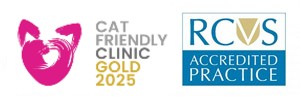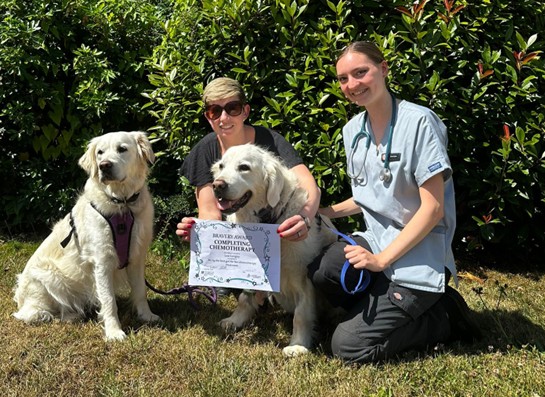Submitted by J. Hudson on Thu, 07/08/2025 - 16:18
Lexi's Story
Lexi is nearly 12 years old and has just finished her 15-week chemotherapy protocol as a follow up treatment after having her spleen removed due to having a splenic haemangiosarcoma.
Lexi’s journey from diagnosis to completion of her preventative chemotherapy gives us a real insight into how the Queen's Veterinary School Hospital (QVSH) Oncology Team work with pets, pet parents, colleagues in practice as well as other teams here at the Vet School in Cambridge - a truly collaborative journey!
Lexi went to her referring vets for a routine vaccination and health check. During that health check her vets noticed that she was quite pale, and when her abdomen was palpated there seemed to be an abnormal swelling. An ultrasound scan was recommended to investigate this which was performed in her local practice. This confirmed a large mass on her spleen and Lexi needed surgery a few days later. Although considered a major surgery, this procedure is routine and when the patient is stable and healthy the outcome and recovery should be good. Luckily for Lexi, her routine health check had picked this up before any major problems had occurred.
The spleen was sent to the laboratory for further tests and was found to contain a haematoma (an area of haemorrhage) however on the edge of this area there were some suspicious cells which lead the pathologists to diagnose a haemangiosarcoma (HSA). Lexi’s vets immediately got in touch with the Oncology Team at the QVSH.
Haemangiosarcoma is an aggressive form of cancer that largely involves the spleen, other internal organs such as the liver or heart. Importantly, the tumour can spread to other organs, including the lungs. Occasionally, a less aggressive form of the disease can arise on the skin or muscles.
We arranged to see Lexi in clinic once she had recovered from her surgery. To prevent or delay the development of tumour spread, we recommended that Lexi receive a course of preventative chemotherapy with a drug called Doxorubicin. This was given every three weeks for 15 weeks, totalling six sessions altogether. We give this as an infusion, over 20 minutes with intravenous fluids and like almost all of our patients receiving chemotherapy, Lexi was treated as an outpatient.
Our chemotherapy patients need to have a blood test to check their platelet and neutrophils counts before a scheduled treatment, which we take and run at the start of their appointment. The blood test is run in our on-site laboratory which gives us the results within 10 minutes. This allows us to see immediately whether we can go ahead with the treatment or not. If all is well, we place a cannula into a vein in the front leg and administer the chemotherapy before Lexi is returned back into the care of her owners with the whole visit taking just under an hour. In between visits Lexi is free to go about her daily routine and continue to enjoy all of her regular pursuits and treats.
Below is a photo of Lexi, her sister and her mum all looking very proud with her completion certificate, presented to them by our final year student, Siena who helped to care for Lexi during her oncology rotations. We wish Lexi well and look forward to hearing about her continued adventures.



